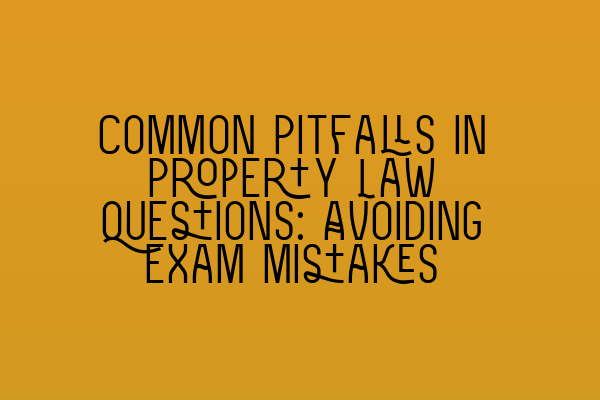Common Pitfalls in Property Law Questions: Avoiding Exam Mistakes
Welcome to SQE Property Law & Land Law! As a leading solicitor firm, we understand the challenges students face when it comes to property law exams. It’s a complex subject that requires a deep understanding of legal principles and the ability to apply them to real-life scenarios. In this blog post, we will discuss common pitfalls in property law questions and provide valuable tips to help you avoid making mistakes in your exams.
1. Misunderstanding the Question
One of the most common mistakes students make is not fully understanding the question. Property law questions can be tricky, and they often contain multiple layers of analysis. It’s essential to read the question carefully, identify the key issues, and determine the relevant legal principles that need to be applied. Taking the time to analyze the question will help you provide accurate answers and avoid unnecessary errors.
2. Failing to Identify All Parties Involved
Property law often involves multiple parties, such as buyers, sellers, landlords, and tenants. Failing to identify all the relevant parties in a question can lead to incomplete answers. Make sure to carefully read the scenario and identify all the parties involved. Consider their roles and legal obligations to provide comprehensive and accurate responses.
3. Ignoring Relevant Case Law and Statutes
Property law is heavily influenced by case law and statutes. It’s crucial to cite relevant cases and statutes to support your arguments and provide a solid legal basis for your answers. Failing to reference relevant sources can significantly weaken your response and result in lower marks. Therefore, during your exam preparation, make sure to study and memorize key cases and statutes that are frequently cited in property law questions.
Pro tip: Stay up-to-date with the latest legal developments and landmark judgments in property law. Reading legal blogs, journals, and attending seminars can help you stay informed about recent changes and enhance your understanding of the subject.
4. Lack of Clear and Logical Structure
Effective communication is key to achieving success in property law exams. Your answers should have a clear and logical structure that allows the examiner to follow your reasoning easily. Start each answer with a concise introduction that outlines the issues to be discussed. Then, use separate paragraphs for each issue, providing relevant legal analysis and applying it to the facts of the scenario. Finally, conclude each answer by summarizing your arguments and providing a clear answer to the question.
5. Neglecting Problem-Solving Skills
Property law questions often present complex scenarios with various legal issues at play. To excel in your exams, you need to demonstrate strong problem-solving skills. Break down the scenario into its constituent parts, analyze each issue separately, and then synthesize your analysis into a coherent and well-reasoned response. Utilize any relevant legal principles, case law, and statutes to support your arguments and provide comprehensive solutions.
6. Insufficient Time Management
Time management is crucial in property law exams. With limited time available, it’s essential to allocate an appropriate amount of time to each question. Read the entire paper before starting, and plan your answers accordingly. Don’t spend too much time on one question that you neglect others. If you’re stuck on a particular question, move on to the next one and come back to it later if time allows. Practice timed mock exams to improve your speed and efficiency.
7. Lack of Exam Practice
Lastly, a common mistake students make is not practicing enough exam-style questions. Property law exams require both knowledge and application. Just studying the theory is not enough; you need to practice applying your knowledge to hypothetical scenarios. Make use of SQE 1 practice exam questions and SQE 1 practice mocks FLK1 FLK2 to hone your skills and become familiar with the exam format. SQE 2 preparation courses can also provide valuable insights into property law questions and help you fine-tune your exam technique.
Conclusion
Property law exams can be challenging, but by avoiding these common pitfalls and following the tips outlined in this blog post, you can significantly improve your chances of success. Don’t forget to also check out our recommended SQE 1 preparation courses and SQE 1 and SQE 2 exam dates on our website. Remember, practice makes perfect, so prioritize exam practice, stay organized, and approach each question with a clear and logical structure. Good luck with your exams!
